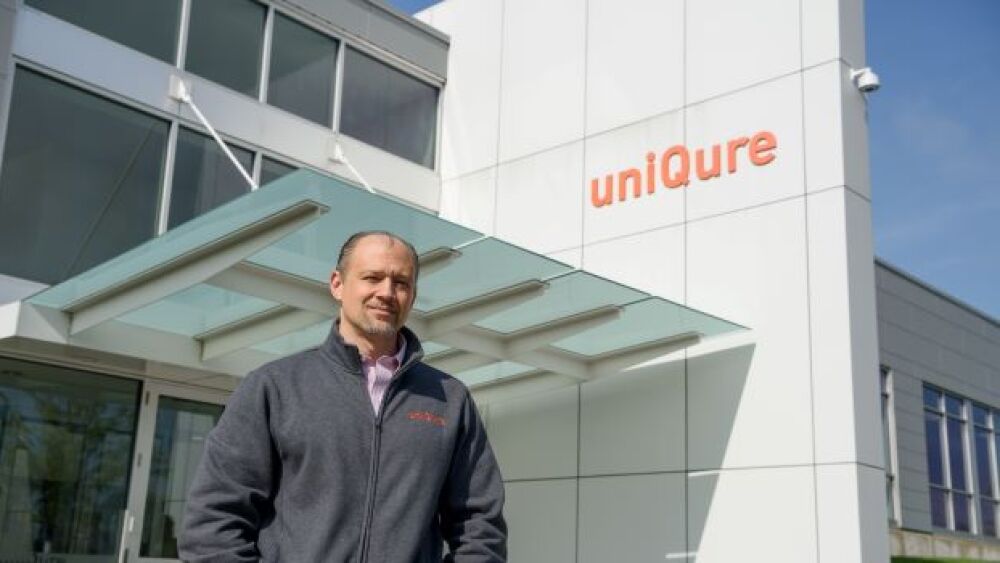Positive top-line data from UniQure’s Phase III HOPE-B gene therapy trial of etranacogene dezaparvove, an investigational AAV5-based gene therapy, point to a potentially curative treatment for patients with moderate to moderately severe hemophilia B.
uniQure Chief Executive Officer, Matt Kapusta. Photo courtesy of uniQure.
Positive top-line data from uniQure’s Phase III HOPE-B trial of etranacogene dezaparvove (AMT-061), an investigational AAV5-based gene therapy, point to a potentially curative treatment for patients with moderate to moderately severe hemophilia B.
uniQure is leveraging more than 20 years of gene therapy leadership experience to bring gene therapies to the market for life-threatening conditions such as hemophilia and terminal ones like Huntington’s disease.
People with severe hemophilia B have levels of zero or less than 1% of human blood clotting Factor IX (hFIX) and therefore require FIX replacement therapy to prevent persistent episodes of internal and external bleeding. These episodes can lead to long-term damage to the joints and can be fatal if the bleed occurs in the brain.
Etranacogene dezaparvove aims to restore the function of blood clotting on a long-term and potentially curative basis. It works by delivering the functional gene for hFIX directly into patients’ liver cells.
FIX activity in the 54 patients, a multi-national group of adult males living with severe or moderately severe hemophilia rapidly increased after dosing from ≤2% to a mean of 37.2 percent at 26 weeks, reaching the trial’s primary endpoint. The secondary endpoint was met when the patients’ use of FIX replacement therapy was reduced by 96% by the end of the trial.
During the 26-week treatment period, increases in Factor IX activity were sustained for up to 18 months and bleeding was nearly eliminated. A total of 72% of patients reported no bleeding episodes, while 15 patients reported a combined total of 21 bleeds.
“In what is probably one of the largest data sets that have been presented thus far for a gene therapy, we have demonstrated that this product, which is administered one time, 30-minute IV-infusion, is safe and well-tolerated, most importantly, and able to lead to durable increases in Factor IX activity that is capable of being functionally curative for these patients,” uniQure Chief Executive Officer, Matt Kapusta told BioSpace.
Gene therapies are delivered to the body using AAV (adeno-associated virus) vectors. While harmless, the human body often develops antibodies to the virus called neutralizing antibodies (NAbs). uniQure’s gene therapies make use of a vector called AAV5, which studies have shown has a much better immunogenicity profile than other types of gene therapy.
Notably, uniQure accepted patients into the trial regardless of their NAbs levels, so these results illustrate the potential for AAV5 for the treatment of a wide range of diseases. uniQure reported that 23 out of 54 patients (42.6%) had NAbs to AAV5.
“We recruited all patients and enrolled them into our study whether or not they had preexisting neutralizing antibodies to our viral vector. Virtually every other clinical study of every other AAV gene therapy has generally excluded patients that have these preexisting neutralizing antibodies,” said Kapusta. “Not only is it, I think, a win for patients with hemophilia B but it potentially could be meaningful as we use AAV to address other diseases and disorders.”
The current treatment protocol for hemophilia B consists of prophylactic or on-demand protein replacement therapy given through frequent intravenously delivered plasma-derived or recombinant Hfix. It can be prohibitively costly, with an annual price tag of between $500,000 to $775,000 per patient in the U.S.
In June, uniQure entered into a $2 billion global collaboration agreement with CSL Behring which acquired exclusive global license rights to commercialize AMT-061. UniQure plans to apply for a Biologic License Application (BLA) from the FDA in 2021.
Featured Jobs on BioSpace






